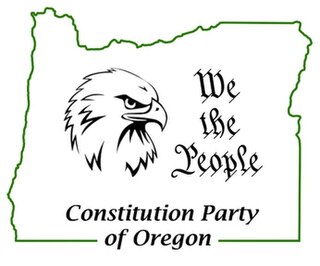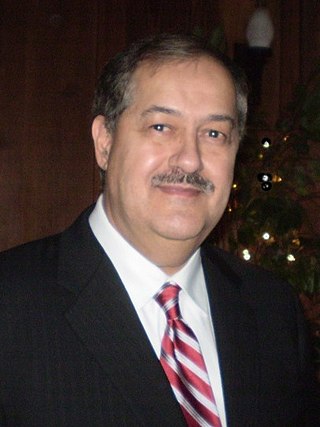
The Constitution Party, named the U.S. Taxpayers' Party until 1999, is an ultra-conservative political party in the United States that promotes a religiously conservative interpretation of the principles and intents of the United States Constitution. The party platform is based on originalist interpretations of the Constitution and shaped by principles which it believes were set forth in the Declaration of Independence, the Bill of Rights, the Constitution and the Bible.

Randall Allen Terry is an American politician and activist. Terry founded the anti-abortion organization Operation Rescue. Beginning in 1987, the group became particularly prominent for blockading the entrances to abortion clinics; Terry led the group until 1991. He has been arrested more than 40 times, including for violating a no-trespass order from the University of Notre Dame to protest against a visit by President Barack Obama.
The Constitution Party National Convention is held by the United States Constitution Party every two to four years. As of April 2024, there have been nine.

The Constitution Party of Oregon is a political party organized as a minor party pursuant to state election law, and recognized by the U.S. state of Oregon as a statewide nominating party.

Joel M. Skousen is an American author of books on survivalism and candidate in the 2024 United States presidential election for the Constitution Party.

The Chuck Baldwin presidential campaign of 2008 began April 10, 2008 as pastor and radio host Chuck Baldwin of Florida announced his candidacy for the Constitution Party presidential nomination. He previously served as the party's vice-presidential nominee in 2004. Baldwin's main opposition for the nomination was former ambassador Alan Keyes, who had just left the Republican Party. After a campaign touting his stands on civil liberties, foreign affairs, and religion, Baldwin won the nomination at the April 26 Constitution Party National Convention. Attorney Darrell Castle was selected as his running mate.
The following is a timeline of major events leading up to the United States presidential election of 2012. The election was the 57th quadrennial United States presidential election held on November 6, 2012.

Voters of the Republican Party elected state delegations to the 2012 Republican National Convention in presidential primaries. The national convention then selected its nominee to run for President of the United States in the 2012 presidential election. There were 2,286 delegates chosen, and a candidate needed to accumulate 1,144 delegate votes at the convention to win the nomination. The caucuses allocated delegates to the respective state delegations to the national convention, but the actual election of the delegates were, many times, at a later date. Delegates were elected in different ways that vary from state to state. They could be elected at local conventions, selected from slates submitted by the candidates, selected at committee meetings, or elected directly at the caucuses and primaries.

From January 3 to June 5, 2012, voters of the Democratic Party chose its nominee for president in the 2012 United States presidential election. President Barack Obama won the Democratic Party nomination by securing more than the required 2,383 delegates on April 3, 2012, after a series of primary elections and caucuses. He was formally nominated by the 2012 Democratic National Convention on September 5, 2012, in Charlotte, North Carolina.

During the 2012 presidential primaries, 51 individuals sought the nomination of the Democratic Party. Incumbent President Barack Obama won the nomination unanimously at the 2012 Democratic National Convention and was re-elected as president in the general election by defeating Republican nominee Mitt Romney. As expected for the incumbent president, Obama won every primary election, but faced more difficulty than projected. Fifteen additional candidates appeared on primary ballots, and of these, four appeared on more than one ballot. Four qualified for convention delegates including: attorney John Wolfe Jr., prison inmate Keith Russell Judd, perennial candidate Jim Rogers, and anti-abortion activist Randall Terry. Each of these had their delegates stripped prior to the convention due to technicalities.
This article contains lists of official third-party and independent candidates associated with the 2012 United States presidential election.

Stephen Edward Broden is an American businessman, pastor, political activist, broadcaster, and former professor from the state of Texas. In 2010, he was the Republican candidate for Texas's 30th congressional district for the United States House of Representatives. He was defeated by Democratic incumbent Eddie Bernice Johnson. He was the Constitution Party's candidate for vice president in the 2024 United States presidential election.

The 2016 presidential campaign of Darrell Castle of the Constitution Party began on the eve of the Constitution Party National Convention in April 2016. On April 16, the Constitution Party nominated Castle on the first ballot, after he won 184 votes out of the 339.5 cast to win the nomination with 54.19%. His running mate, Scott Bradley, was nominated by voice vote.

Below is a detailed tally of the results of the 2020 Republican Party presidential primary elections in the United States. In most U.S. states outside New Hampshire, votes for write-in candidates remain untallied.

The 2020 Constitution Party presidential primaries were a series of primary elections determining the allocation of delegates in the selection of the Constitution Party's presidential nominee in the 2020 United States presidential election. On May 2, 2020, the Constitution Party nominated Don Blankenship for president and William Mohr for vice-president. Several state parties split from the national Constitution Party to nominate their own candidates.
This article lists third party and independent candidates, also jointly known as minor candidates, associated with the 2024 United States presidential election.

The 2024 United States presidential election in Idaho took place on Tuesday, November 5, 2024, as part of the 2024 United States presidential election in which all 50 states plus the District of Columbia participated. Idaho voters chose electors to represent them in the Electoral College via a popular vote. The state of Idaho has 4 electoral votes in the Electoral College, following reapportionment due to the 2020 United States census in which the state neither gained nor lost a seat.

The 2024 United States presidential election in Utah took place on Tuesday, November 5, 2024, as part of the 2024 United States presidential election in which all 50 states plus the District of Columbia participated. Utah voters chose electors to represent them in the Electoral College via a popular vote. The state of Utah has six electoral votes in the Electoral College, following reapportionment due to the 2020 United States census in which the state neither gained nor lost a seat.

The 2024 Utah gubernatorial election was held on November 5, 2024, to elect the governor of Utah, concurrently with the 2024 U.S. presidential election, as well as elections to the United States Senate and the United States House of Representatives and various state and local elections. Incumbent Republican Governor Spencer Cox won re-election to a second term, defeating Democratic nominee, state Representative Brian King and Republican state Representative Phil Lyman, who ran as a write-in candidate after being defeated in the Republican primary. Primary elections took place on June 25, 2024. This was the smallest percent of the vote by a winning republican since the 1992 election, which also saw a major independent candidate. Cox's 24.43% margin of victory was also the smallest since 2004.
In the 2024 United States presidential election, different laws and procedures govern whether or not a candidate or political party is entitled to appear on voters' ballots. Under Article 2, Section 1 of the United States Constitution, laws about election procedure are established and enforced by the states. Additionally, there are often different requirements for primary and general elections, and requirements for primary elections may additionally differ by party.


















